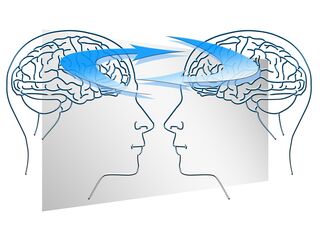Intelligence
What Do Intellectually Humble People Do?
Is there a difference between self and peer ratings for intellectual humility?
Posted November 1, 2020 Reviewed by Ekua Hagan

Intellectual humility has long been theorized to be an intellectual virtue, meaning that it reflects qualities necessary for critical thinking and forming accurate belief systems. In essence, intellectual humility may lie between the vice of intellectual arrogance (e.g., believing that one is always correct and remaining inflexible even when presented with compelling evidence) and the vice of intellectual servility (e.g., changing one’s mind in the face of any and all evidence and focusing entirely on one’s intellectual limitations). Intellectual humility, thus, comprises an appropriate attentiveness to the flaws in one’s web of beliefs in conjunction with a tendency to be relatively unconcerned with one’s status in the eyes of others.
Researchers and laypeople alike hypothesize that intellectual humility not only comprises these virtuous metacognitive features (e.g., thinking about how we think) but interpersonal features (e.g., relational, social) as well. Samuelson and colleagues (2015), for instance, found evidence to suggest that lay ratings (e.g., community members rather than academics provide ratings) of intellectual humility include separable social (e.g., fair, kind) and metacognitive (e.g., inquisitive, curious) features. Studies suggest that self-reported intellectual humility is related to both metacognitive constructs, such as intelligence and an enhanced ability to parse strong from weak evidence, and social constructs, such as an enhanced tendency to forgive others following disagreement and tolerance for opposing views.
Despite these advances in defining intellectual humility, Meagher and colleagues (2020) point out a still unresolved, and pragmatically important, question: How do people make judgments of intellectual humility? Put differently, what information do people use to form impressions of another person’s intellectual humility?
Consistent with these questions, it is unclear whether and to what extent self-reported intellectual humility corresponds with peer-reported intellectual humility. Does the self (“I”) use the same information to make intellectual humility judgments as others (“my friend”)? Meagher and colleagues (2020) sought to address these questions in two studies now published in The Journal of Positive Psychology.
In the first study, Study 1, the authors recruited a sample of more than 100 undergraduate pre-nursing students enrolled in psychology courses. In these courses, the students were randomly assigned to groups at the beginning of the semester to complete team-based learning activities. At the end of the academic semester, participants in the groups provided ratings for (a) themselves and (b) other group members on a variety of personality questionnaires, including intellectual humility. Perhaps surprisingly, self- and peer-ratings of intellectual humility were not significantly related.
Moreover, some interesting patterns emerged across sources of ratings. Individuals who rated themselves as high on intellectual humility tended to rate themselves as high on honesty and openness and low on arrogance. Perceptions of individuals scoring high on intellectual humility corresponded with perceptions of individuals scoring high on trait agreeableness and low on dominance. These results suggest that those who perceive themselves as intellectually humble may focus more on metacognitive features, such as openness, than peers in making their judgments. In contrast, peers may focus on social features, such as agreeableness, when making intellectual humility judgments.
To further investigate their research questions, Meagher and colleagues (2020) conducted another study in which they recruited more than 150 community members to engage in conversations about contentious political issues (Study 2). This study afforded the opportunity to conduct a “risky test” — if intellectual humility is not exhibited in a contentious conversation, what does this mean about our definitions of intellectual humility? We should expect intellectual humility to “shine” in situations such as these. Hence, risky tests allow researchers to examine “where the rubber meets the road” for a certain theory. As esteemed clinical psychologist Paul Meehl (1978) wrote, “a theory is corroborated to the extent that we have subjected it to such risky tests; the more dangerous tests it has survived, the better corroborated it is” (p. 817)

In Study 2, participants were assigned to groups based on ratings provided for certain political issues — those who disagree were put in the same group. Following the interaction and conversation about the assigned political topic, participants rated (a) themselves and (b) other group members on personality questionnaires, including intellectual humility. In addition, researchers coded for behaviors in the interaction, such as the number of interjections one made, the valence of these interjections (e.g., positive, negative), and the number of inquiries one made.
Similar to Study 1, they found evidence for a fascinating discrepancy between self- and peer-reported intellectual humility. Those who rated themselves as highly intellectually humble also perceived themselves as participating more in the conversation, meaning they spoke more, inquired more, and generated more arguments. In contrast, those who were perceived as intellectually humble by others in the group were also perceived as making fewer arguments and negative interjections (e.g., interrupting to voice disagreement).
Collectively, their results suggest that peers may conflate intellectual humility with conciliation or diffidence. Those who agree with others and are supportive in a discussion are perceived as intellectually humble. Although intellectually humble individuals may in fact agree with others when provided with compelling evidence to do so and offer support in so far as they are respectful, peer-ratings differed from self-ratings. Those who perceive themselves as intellectually humble also perceive themselves as engaging more actively in discussions, even when not in agreement with others.

How, if at all, do we put these pieces together? Perhaps we do not need to try and reconcile these discrepancies. It is possible that each rating source, namely self and peer, samples different slices from the same pie: the self samples from the metacognitive piece and the peer samples from the social piece. Both are essential for productive conversation and respectful dialogue.
And this one study, while informative, does not resolve these lingering questions. Future work is needed to continue exploring this discrepancy between self- and peer-ratings of intellectual humility. In exploring this discrepancy, research should consider whether and to what extent this discrepancy bears implications for (a) definitions of intellectual humility and (b) positive interpersonal interactions across settings (e.g., religion, the workplace).
References
Hook, J. N., Davis, D. E., Van Tongeren, D. R., Hill, P. C., Worthington Jr, E. L., Farrell, J. E., & Dieke, P. (2015). Intellectual humility and forgiveness of religious leaders. The Journal of Positive Psychology, 10, 499-506.
Hook, J. N., Farrell, J. E., Johnson, K. A., Van Tongeren, D. R., Davis, D. E., & Aten, J. D. (2017). Intellectual humility and religious tolerance. The Journal of Positive Psychology, 12, 29-35.
Leary, M. R., Diebels, K. J., Davisson, E. K., Jongman-Sereno, K. P., Isherwood, J. C., Raimi, K. T., ... & Hoyle, R. H. (2017). Cognitive and interpersonal features of intellectual humility. Personality and Social Psychology Bulletin, 43, 793-813.
Meagher, B. R., Leman, J. C., Heidenga, C. A., Ringquist, M. R., & Rowatt, W. C. (2020). Intellectual humility in conversation: Distinct behavioral indicators of self and peer ratings. The Journal of Positive Psychology, 1-13.
Meehl, P. E. (1978). Theoretical risks and tabular asterisks: Sir Karl, Sir Ronald, and the slow progress of soft psychology. Journal of Consulting and Clinical Psychology, 46, 806-834.
Samuelson, P. L., Jarvinen, M. J., Paulus, T. B., Church, I. M., Hardy, S. A., & Barrett, J. L. (2015). Implicit theories of intellectual virtues and vices: A focus on intellectual humility. The Journal of Positive Psychology, 10, 1–18.
Zmigrod, L., Zmigrod, S., Rentfrow, P. J., & Robbins, T. W. (2019). The psychological roots of intellectual humility: The role of intelligence and cognitive flexibility. Personality and Individual Differences, 141, 200-208.




